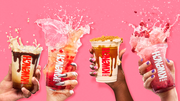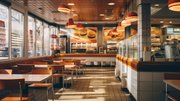Operations
Many QSR customers not happy with drive-thrus, would welcome automation

September 21, 2021
More than half of Americans, 65%, who visited QSRs in the last six months have had an unpleasant drive-thru experience, according to a Harris Poll survey conducted online on behalf of Xenial. The survey polled over 2,000 U.S. consumers, according to a press release.
Reasons for the unpleasant drive-thru experience were understaffing, cited by 26% and long lines, cited by 30%.
Increased pressure on drive-thrus — driven by Covid-19 protocols, consumer health concerns and labor shortages — is causing many QSRs to invest in automation. The Xenial/Harris Poll survey revealed customers are receptive to automation. Nearly half who visit QSRs (49%) are willing to eliminate all human interaction when ordering and receiving their fast-food, assuming orders are received and fulfilled accurately and in a timely fashion. Younger Americans are more likely than their older counterparts to say this (62% for those ages 18 to 44).
Among those who are willing to eliminate human interaction, the reasons for doing so varied widely. About one in three Americans (32%) said they prefer not to interact with people unless it's necessary, this reason being more likely among those ages 18 to 44 than those ages 65+ (37% versus 29%). Just about a third of those, 31%, want to avoid human contact for health reasons. More than two in five of those who visit QSRs (42%) believe automated systems would be faster than humans.
"There is a broad base of support for an automated QSR customer experience," Chris Siefken, head of technology for Xenial, said in the release. "Ongoing labor shortages and consumer appetite for the drive thru are putting enormous stress on restaurants, and new technologies can help alleviate pressure points and free up workers to fulfill orders accurately and quickly."
Nearly one in five (19%) of those willing to eliminate human interaction are willing to do so because they believe automated systems would be more friendly than humans. Among those who had a negative drive-thru experience, 36% listed the poor attitude or behavior of drive thru staff as reasons.
"Labor shortages are highlighting the fact that automation isn't necessarily about replacing existing workers," Siefken said. "It's about making quick service restaurant jobs easier so existing workers have the bandwidth to provide excellent customer service at those points where people are needed. Automation can improve the overall employee experience, which can lead to better retention."
Asked what purchase channel they most often utilize when visiting a QSR, 55% choose the drive thru, 18% identified in-restaurant takeout, 19% selected in-restaurant dining and 8% chose curbside pickup.
 ChatGPT
ChatGPT Grok
Grok Perplexity
Perplexity Claude
Claude








